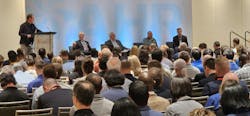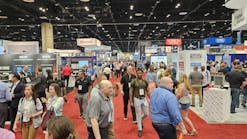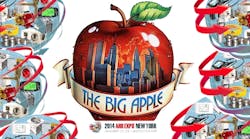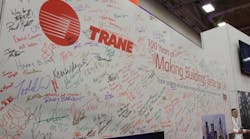Latest from AHR Expo
AHR Day 2: HPAC's Products Picks
AHR Expo 2025: Scenes from the Second Day
AHR Day 1: HPAC's Products Picks
Taco Presents Dan Holohan Comfort Award at AHR Expo
AHR Sessions: Our Collection of Field Reports
AHR Expo: "Wow! What a Week!"
EXPO Report: Day 1 Highlights
Calendar of HVACR Training and Education Events
Weil I'm Thinking of it: Who Knew How Green the Big Apple Is?
Happy new year! As I write this, the mechanical system industry is planning to venture forth to the Big Apple to celebrate the 66th annual AHR Expo. The entire HVACR industry will descend upon the Jacob Javits Center from Jan. 21-23 to bear witness to the multitude of products, people, and technologies that will, hopefully, help drive continued economic growth for our sector as well as the entire country.
Two years ago, HPAC Engineering published an article on New York City’s (NYC) “Greener, Greater Buildings Plan,” written by editorial advisor Ron Wilkinson, PE, LEED AP. The article focused on how NYC set the stage for an overall plan on “greening” its commercial buildings with a universal requirement for existing building commissioning.
The Greener, Greater Buildings Plan (GGBP) actually came into being in 2009 as part of an effort known as PlaNYC, which was undertaken by the NYC Office of Long Term Planning and Sustainability.
Then-Mayor Michael Bloomberg signed four pieces of legislation that made this plan into law and, according to Wilkinson, “set the pace for commissioning in the heavily inertial world of American building design and construction.”
Fast forward to today. As we prepare for the AHR Expo, what has changed? Bloomberg is gone—the city has a new mayor, with the recent swearing in of Bill de Blasio. He is the city’s 109th mayor, a Democrat and liberal who promises sweeping changes in how the city is run. His focus, for now, is on the police department and educational system, so it’s anyone’s guess what impact he’ll have on the GGBP.
In terms of accomplishments, the GGBP has already passed the halfway mark of reducing citywide greenhouse gas emissions by 30% by 2030. In addition, New York City recently released its second report of benchmarking data, providing the first-of-its-kind year-to-year analysis of energy and water use in the city’s largest private-sector buildings. Over 1.7 billion sq. ft. of space was benchmarked and analyzed by building sector, borough, energy and water use, greenhouse gas emissions, fuel mix, and more. To download the full report, go to tinyurl.com/NYC-GGBP2013.
Related to the GGBP is the number of LEED registered and certified projects (through the first quarter of 2013) in NYC. According to a Website known as The Green Dash Board, NYC has 881 such projects. In a city of more than one million buildings, this may seem like a small number, but it represents a very good start based on the fairly recent laws and requirements.
Does that mean the buildings aren’t achieving the efficiencies that the NYC government is looking for? Not at all, according to the The Real Deal, which says, “LEED buildings may be a step in the right direction, but many builders argue that truly sustainable buildings ought to be the ultimate goal, and that LEED standards should be completely overhauled.” In fact, The Real Deal says many NYC commercial real estate owners and developers are looking beyond LEED in their mission to achieve sustainability.
Then there is the Javits Center itself. The headquarters for the 2014 AHR Expo has been on the green bandwagon since 2004 by replacing most of the lighting fixtures with more efficient fluorescent bulbs, ballasts, metal-halide lamps, and more.
So as you walk the aisles while visiting the more than 1,800 exhibitors, think about how our host city is going out of its way to be one of the premier sustainable cities in the U.S., if not the world. We have a huge role in making that happen. Visit us in booth 2302.
See you there.











